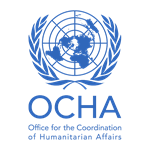
DRC and partners win the Kluz Prize for PeaceTech
The Danish Refugee Council, host of the Data Entry and Exploration Project (DEEP) with the IFRC, UN and NGOs, is honored to receive the Kluz Prize for PeaceTech during the UN General Assembly Week in New York City.

Imagine a free and open-source, web-based suite of AI-enabled tools that help humanitarians protect human rights and respond to disasters globally. Now stop imagining, because the Data Entry and Exploration Platform (DEEP), developed via expert collaboration in the wake of the tragic Nepal earthquake over 8 years ago, has realized this lofty goal.
Since 2016, thousands have used this open source tool to generate actionable data for effective responses, to protect human rights and respond to disasters globally.
Building upon this proven track record of collaboration, the DEEP Secretariat - administratively hosted by the Danish Refugee Council’s (DRC) – was honored during this week’s 79th United Nations General Assembly (UNGA) as a project of special distinction for PeaceTech by the Kluz Prize in New York, NY on September 20th 2024.
Thousands use DEEP everyday
From conflict in Ukraine to the tragic Syria and Türkiye earthquakes, the DEEP is used every day by thousands of humanitarian information managers to further the important work of the Protection Cluster, and has recently crafted advanced analytics for the UN, IFRC, and CDEMA stakeholders throughout the 2024 Atlantic and Caribbean Hurricane Season.
Partners working together
As DRC and partners meet the world’s most intractable challenges with this scale-able, web-based platform built upon humanitarian data principles, the DEEP governance structure proves it takes a village to collaborate and innovate.
The DEEP Steering Committee, composed of key organizations such as UNOCHA, IFRC, and DRC - and a broader Technical Advisory Group (TAG) serve as a collaborative forum aimed at supporting the platform’s development.
This diverse group of stakeholders are to be commended for their longstanding support of DEEP and includes Data Friendly Space (DFS - DEEP’s technical partner), as well as UNHCR, UNICEF, IMMAP, IDMC and others. Support for the DEEP has been made possible by the generous support of the American people through the United States Agency for International Development (USAID).
Next step for DEEP
Looking forward, the next step of the DEEP community’s development will further the important humanitarian goals of interoperability, localized capacity building, and empowering busy humanitarians via NLP (Natural Language Processing) automation to tackle ever more complex challenges.
Building upon the DEEP’s longstanding collaboration with the US Agency for International Development’s Bureau for Humanitarian Affairs (USAID BHA), from 2025 onwards the DEEP and partners will add quantitative analysis and expert judgement capabilities to this suite of tools via a Joint Analytical Workspace (JAWS).
As the DEEP Secretariat, Governance partners, and our growing global user community look to the next 8 years, the unique honor by the Kluz Prize for PeaceTech reinforces the importance of the core tenets of collaboration, open-source innovation, and the importance of rigorous data analyses to ensure human rights for all.


UNICEF

UNHCR

United Nations Office for the Coordination of Humanitarian Affairs

Data Friendly Spaces

IDMC

IFRC

iMMAP

OHCHR

Okular Analytics
